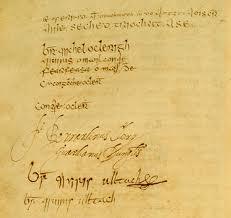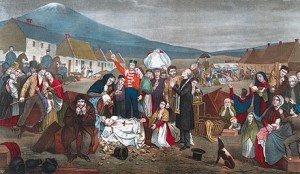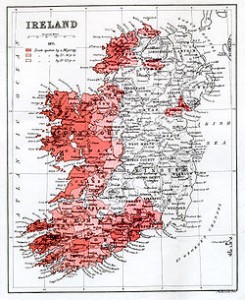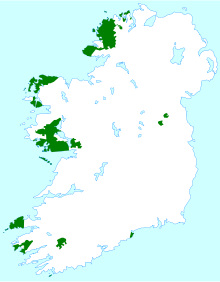The Irish Language, Part I: Decline
 In this, first part of a new audio series, we look at the decline of the Irish language from the Tudor Conquest of the 1500s to the Great Famine of the 1840s.
In this, first part of a new audio series, we look at the decline of the Irish language from the Tudor Conquest of the 1500s to the Great Famine of the 1840s.
(Click on the links to listen)
The Irish language from Tudor conquest to the famine
Contributors, in order, are Padraig Lenihan and Neil Buttimer, questions by John Dorney
Here we trace the decline of the Irish language from a dominant postion in the 1500s, to its catastrophic collapse after the Great Famine of the 1840s. In the intervening period, it had also come down in social stature. While Irish was the language of the native elite in the 1500s, by the early 19th century, it was spoken principally by the poor in the rural west.
Although the absolute number of Irish speakers, at four million people, may have been the highest ever, the language had retreated completely from the east of the country and collapsed even in the west after the 1840s.
Contributors, in order, Padraig Lenihan, Neil Buttimer, Fearghal McGarry
Here we ask why the Irish language first lost its pre-eminent position in Ireland and then declined almost to the point of extinction. Factors often cited are the famine of th 1840s, emmigration and the introduction of English-speaking compulsory National Schools in the 1830s. However, Irish had already lost its grip in much of the country by then.
Padraig Lenihan argues that factors such as the dispossession of the native elite, and the de-coupling of the language from social prestige were key factors. Fearghal McGarry notes that by the early 20th century, in Monaghan as in many other rural areas, the language was confined to the very elderly.
Contributors in order; Neil Buttimer and Padraig Lenihan.
While not absolutely unprecedented, the near death of Irish was very unusal for a modern European language. Here we look at the decline of the language by comparison with other minority languages.
Second Part- The Irish Language, A Phoenix from the Flames?

About the Contributors
Padraig Lenihan is historian of early modern Ireland and author of Confederate Catholics at War 1641-49, Conquest and Resistance: War In Seventeenth Century Ireland, 1690, Battle of the Boyne, and most recently, Consolidating Conquest, Ireland 1603-1727. He teaches in the National University of Ireland, Galway.
Neil Buttimer is an Irish language scholar. He has lectured in the Department of Modern Irish of University College Cork since 1982.
His research and teaching are in medieval Irish tradition, pre-Famine Gaelic Ireland and contemporary cultural policy.
He has published The heritage of Ireland (with Colin Rynne and Helen Guerin, eds), 2000. Cork history and society: interdisciplinary essays on the history of an Irish county (Dublin: 1993), and Catalogue of Irish manuscripts in the University of Wisconsin-Madison (Dublin: 1989 ).
He also wrote a chapter of the New History of Ireland on the Irish language since 1921.
Fearghal McGarry is a senior lecturer in Modern History at Queens University Belfast. He has written a series of books on Irish republicanism including; Irish Politics and the Spanish Civil War, Frank Ryan, Eoin O’Duffy a Self Made Hero and The Rising, Ireland Easter 1916 and edited the collection, Republicanism in Modern Ireland.

Podcast: Play in new window | Download
